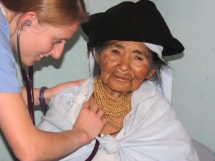Goal is to reduce number of bloodborne diseases
LOUISVILLE, Ky. (June 10, 2015) — Louisville’s Syringe Exchange Program began today in a mobile unit adjacent to Public Health and Wellness headquarters at 400 E. Gray St. Initial operating hours are Monday, Friday, and Saturday from 11 a.m. to 2 p.m. and Tuesday, Wednesday and Thursday from 3-6 p.m.
 “The Syringe Exchange Program will help to prevent the spread of bloodborne diseases such as HIV and hepatitis C in our community,” said interim Public Health and Wellness director Dr. Sarah Moyer. “It will also lead participants to testing and treatment. I want to thank the Mayor Fischer, the Metro Council, the Board of Health, and all the community partners who have been so supportive.”
“The Syringe Exchange Program will help to prevent the spread of bloodborne diseases such as HIV and hepatitis C in our community,” said interim Public Health and Wellness director Dr. Sarah Moyer. “It will also lead participants to testing and treatment. I want to thank the Mayor Fischer, the Metro Council, the Board of Health, and all the community partners who have been so supportive.”
The exchange will provide free syringes, HIV testing and prevention supplies, as well as education regarding hepatitis C transmission, sexually transmitted diseases, wound care, and proper syringe disposal. Referrals will be made for those who test positive for HIV or hepatitis C as well as for those seeking drug treatment, and other health and social services.
The Seven Counties Services, Inc., Jefferson Alcohol and Drug Abuse Center (JADAC) will assign an addictions treatment case manager to the syringe exchange program whose responsibility is to inform participants and make treatment referrals. The case manager will be available to syringe exchange staff and participants 30 hours per week and some evenings.
Louisville is the first city in Kentucky to open a syringe exchange. The 2015 Kentucky legislature enacted legislation allowing local health departments to operate substance abuse outreach programs which include syringe exchange programs. The Louisville Metro Council adopted an ordinance to set a syringe exchange program for the city and the Louisville Metro Board of Health approved the exchange in May.
A 2005 study found that HIV rates decreased by nearly 6 percent in cities that had syringe exchange programs compared to a national increase of nearly 6 percent per year. The number of HIV cases linked to intravenous drug use dropped by 80 percent in Washington D.C. from 2007 to 2011, with the number of cases decreasing from 149 to 30.
Syringe exchanges help to prevent the spread of HIV and hepatitis C. and bring drug addicted individuals in contact with the health system where can they be tested for HIV and hepatitis and, if positive, be treated. Studies show that program participants were five times more likely to enter drug treatment than IV drug users who did not participate in syringe exchange programs.




















Add Comment